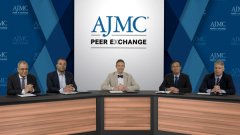
Navigating HCC Treatment-Related Toxicities
Toxicity management in HCC treatment is discussed by medical experts.
Episodes in this series

The transcript is part of a medical expert discussion on the management of hepatocellular carcinoma (HCC) and its treatment strategies, focusing on the challenges of immunotherapy and the importance of education for both physicians and patients. The experts emphasize the need for vigilance as adverse events can occur unpredictably and stress the significance of recognizing early signs of potential complications, such as headaches and diarrhea. They discuss the importance of comprehensive patient support systems, including access to various specialists like ophthalmologists, rheumatologists, and dermatologists, as well as the role of nurse navigators and the implementation of referral systems to overcome barriers to care. The conversation highlights the complexity of managing treatment toxicities, especially in the context of the COVID era, where distinguishing between different symptoms can be challenging. The experts stress the significance of understanding the patient’s social background and support system, with a particular focus on optimizing care for vulnerable groups like the elderly or those with poor socioeconomic status. They emphasize the necessity of considering the individual patient’s quality of life and maintaining a patient-centered approach throughout the treatment process. The discussion underscores the importance of clinical pathways and the practical application of therapeutic approaches in real-world settings, addressing the gap between clinical trials and actual patient outcomes.
Overall, the conversation reflects the multidimensional nature of managing HCC, with a strong emphasis on patient education, comprehensive support systems, and a holistic understanding of the patient’s social and clinical context. The experts advocate for a personalized and proactive approach to managing treatment toxicities, ensuring optimal patient care and quality of life throughout the treatment journey.
Video synopsis is AI-generated and reviewed by AJMC editorial staff.
Newsletter
Stay ahead of policy, cost, and value—subscribe to AJMC for expert insights at the intersection of clinical care and health economics.










